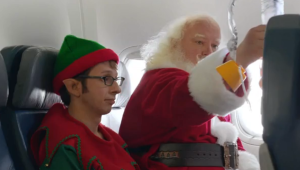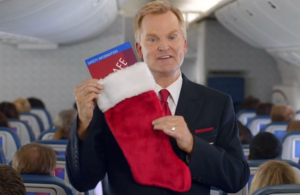If you are traveling this holiday you are sure to notice how the flights are more full than normal. This can lead to stressful situations if your flight is delayed, you mis-connect or you find yourself on the receiving end of an oversold flight. In this post we’ll outline a few of these steps along with passenger rights regarding involuntary oversold situations. And always make sure you know if your flight has travel waivers or not, because you can change your flight for free, often to a better flight if there is availability.
Tips During Oversold Situation
Stay Calm
This is most often the most important rule. There are a number of reasons why a flight can be oversold and rarely is it the fault of the person you are speaking with, either in person or over the phone. Everyone that is traveling during this time is also likely visiting family members during the Holidays. Most importantly, we are all people. I find that a calm demur and kindness will help out better than demanding your way. After all, honey gets more bees than vinegar.
Know The Airline Phone NumbersÂ
As soon as I know there is a delay, cancellation, or oversold situation where it may not be in my favor, I immediately call the airline’s direct number. I also hop in the line at this point too. This way I’ll have to irons in the fire with regard to getting another flight to my satisfaction.
Know Alternative Flights To Destination
Help them help you. When you do speak with someone make sure you know a few possible alternative options. If you are flying from New York to Orlando, consider Tampa or Daytona Beach airports instead. Considering alternative airports when others aren’t can open up options.
DOT Guidelines For Oversold Flights
Here are some highlights on Overbooking from the DOT’s consumer guide to travel.
Voluntary Bumping
This is when the flight is oversold and the passenger agrees to take a later flight.
Almost any planeload of airline passengers includes some people with urgent travel needs and others who may be more concerned about the cost of their tickets than about getting to their destination on time. DOT rules require airlines to seek out people who are willing to give up their seats for compensation before bumping anyone involuntarily. Here’s how this works. At the check-in or boarding area, airline employees will look for volunteers when it appears that the flight has been oversold. If you’re not in a rush to arrive at your next destination, you can give your reservation back to the airline in exchange for compensation and a later flight. But before you do this, you may want to get answers to these important questions:
* When is the next flight on which the airline can confirm your seat? The alternate flight may be just as acceptable to you. On the other hand, if the airline offers to put you on standby on another flight that’s full, you could be stranded.
* Will the airline provide other amenities such as free meals, a hotel room, transfers between the hotel and the airport, and a phone card? If not, you might have to spend the money it offers you on food or lodging while you wait for the next flight.
DOT has not mandated the form or amount of compensation that airlines offer to volunteers. DOT does, however, require airlines to advise any volunteer whether he or she might be involuntarily bumped and, if that were to occur, the amount of compensation that would be due. Carriers can negotiate with their passengers for mutually acceptable compensation. Airlines generally offer a free trip or other transportation benefits to prospective volunteers. The airlines give employees guidelines for bargaining with passengers, and they may select those volunteers willing to sell back their reservations for the lowest price. If the airline offers you a free ticket or a transportation voucher in a certain dollar amount, ask about restrictions. How long is the ticket or voucher good for? Is it “blacked out” during holiday periods when you might want to use it? Can it be used for international flights?
Involuntary Bumping
This is when a flight is oversold and passengers are involuntarily moved (bumped) to another flight.
DOT requires each airline to give all passengers who are bumped involuntarily a written statement describing their rights and explaining how the carrier decides who gets on an oversold flight and who doesn’t. Those travelers who don’t get to fly are frequently entitled to denied boarding compensation in the form of a check or cash. The amount depends on the price of their ticket and the length of the delay:
* If you are bumped involuntarily and the airline arranges substitute transportation that is scheduled to get you to your final destination (including later connections) within one hour of your original scheduled arrival time, there is no compensation.
* If the airline arranges substitute transportation that is scheduled to arrive at your destination between one and two hours after your original arrival time (between one and four hours on international flights), the airline must pay you an amount equal to 200% of your one-way fare to your final destination that day, with a $650 maximum.
* If the substitute transportation is scheduled to get you to your destination more than two hours later (four hours internationally), or if the airline does not make any substitute travel arrangements for you, the compensation doubles (400% of your one-way fare, $1300 maximum).
* If your ticket does not show a fare (for example, a frequent-flyer award ticket or a ticket issued by a consolidator), your denied boarding compensation is based on the lowest cash, check or credit card payment charged for a ticket in the same class of service (e.g., coach, first class) on that flight.
* You always get to keep your original ticket and use it on another flight. If you choose to make your own arrangements, you can request an “involuntary refund” for the ticket for the flight you were bumped from. The denied boarding compensation is essentially a payment for your inconvenience.
* If you paid for optional services on your original flight (e.g., seat selection, checked baggage) and you did not receive those services on your substitute flight or were required to pay a second time, the airline that bumped you must refund those payments to you.
Like all rules, however, there are a few conditions and exceptions:
* To be eligible for compensation, you must have a confirmed reservation. A written confirmation issued by the airline or an authorized agent or reservation service qualifies you in this regard even if the airline can’t find your reservation in the computer, as long as you didn’t cancel your reservation or miss a reconfirmation deadline.
* Each airline has a check-in deadline, which is the amount of time before scheduled departure that you must present yourself to the airline at the airport. For domestic flights most carriers require you to be at the departure gate between 10 minutes and 30 minutes before scheduled departure, but some deadlines can be an hour or longer. Check-in deadlines on international flights can be as much as three hours before scheduled departure time. Some airlines may simply require you to be at the ticket/baggage counter by this time; most, however, require that you get all the way to the boarding area. Some may have deadlines at both locations. If you miss the check-in deadline, you may have lost your reservation and your right to compensation if the flight is oversold.
* As noted above, no compensation is due if the airline arranges substitute transportation which is scheduled to arrive at your destination within one hour of your originally scheduled arrival time.
* If the airline must substitute a smaller plane for the one it originally planned to use, the carrier isn’t required to pay people who are bumped as a result. In addition, on flights using aircraft with 30 through 60 passenger seats, compensation is not required if you were bumped due to safety-related aircraft weight or balance constraints.
* The rules do not apply to charter flights, or to scheduled flights operated with planes that hold fewer than 30 passengers. They don’t apply to international flights inbound to the United States, although some airlines on these routes may follow them voluntarily. Also, if you are flying between two foreign cities — from Paris to Rome, for example — these rules will not apply. The European Commission has a rule on bumpings that occur in an EC country; ask the airline for details, or go to http://ec.europa.eu/transport/passengers/air/air_en.htm.
Bottom Line
I know it can be stressful traveling during the Holidays. I usually avoid it unless it all together, instead seeking out travel in the week before or after Christmas. But with a few simple steps and knowing your rights, you can help improve the chances of a successful trip.
How do you handle traveling during the holidays? Or do you avoid it all together?
Related Posts
- Winter Weather Waivers Up For Last Minute Holiday Travel
- Holiday Travel Headaches – Are You Ready For Thanksgiving Travel?Â
- Delta’s 757 Business Elite Seats – Holiday Traveling Isn’t So Bad
- Turkeys, Wrapped Presents And Flying – Holiday Travel Tips



Leave a Reply